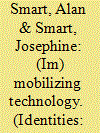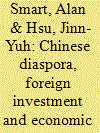|
|
|
Sort Order |
|
|
|
Items / Page
|
|
|
|
|
|
|
| Srl | Item |
| 1 |
ID:
113896


|
|
|
|
|
| Publication |
2011.
|
| Summary/Abstract |
Immobilization is generally thought to result from power and poverty acting against the acceleration produced by science and technology. In this article we explore neglected countervailing trends, such as quarantines, health inspections, and import bans, where science has the effect of restricting mobility, which we refer to as "slow science." As well as increasing mobility, science can be mobilized for political projects of restricting movement, but this possibility is neglected because of cultural assumptions fundamental to modernity. Both science and technology can be enrolled for projects of slowing mobility as well as increasing mobility. Drawing on actor-network theory, we examine the enrolment of science and technology into restricting movement in various ways. These issues are explored first through an overview of the neglected genealogy of the ways in which science and technology have slowed movement, particularly across national borders, and second through a short case study of how food safety concerns affect the movement of beef across borders. The case study discusses how "slow science" diagnoses threats posed by mobility and develops technologies to immobilize certain entities. These entities have almost always been biological organisms (including humans) or their products due to the self-reproducing qualities of invasive species, bacteria, or viruses. Uniquely, WTO rules about food require that restrictions be based on sound science, resulting in trade disputes focused on scientific interpretations.
|
|
|
|
|
|
|
|
|
|
|
|
|
|
|
|
| 2 |
ID:
113895


|
|
|
|
|
| Publication |
2011.
|
| Summary/Abstract |
In this introduction, we outline the general conceptual framework that ties the various contributions to this special issue together. We argue for the importance of anthropology to "take on" mobility and discuss the advantages of the ethnographic approach in doing so. What is the analytical purchase of mobility as one of the root metaphors in contemporary anthropological theorizing? What are the (dis)advantages of looking at the current human condition through the lens of mobility? There is a great risk that the fast-growing field of mobility studies neglects different interpretations of what is going on, or that only patterns that fit the mobilities paradigm will be considered, or that only extremes of (hyper)mobility or (im)mobility will be given attention. The ethnographic sensibilities of fieldworkers who learn about mobility while studying other processes and issues, and who can situate movement in the multiple contexts between which people move, can both extend the utility of the mobilities approach, and insist on attention to other dynamics that might not be considered if the focus is first and last on (im)mobility as such. In this special issue, we do not want to discuss human mobility as a brute fact but rather analyze how mobilities, as sociocultural constructs, are experienced and imagined.
|
|
|
|
|
|
|
|
|
|
|
|
|
|
|
|
| 3 |
ID:
054088


|
|
|
|
|
|
|
|